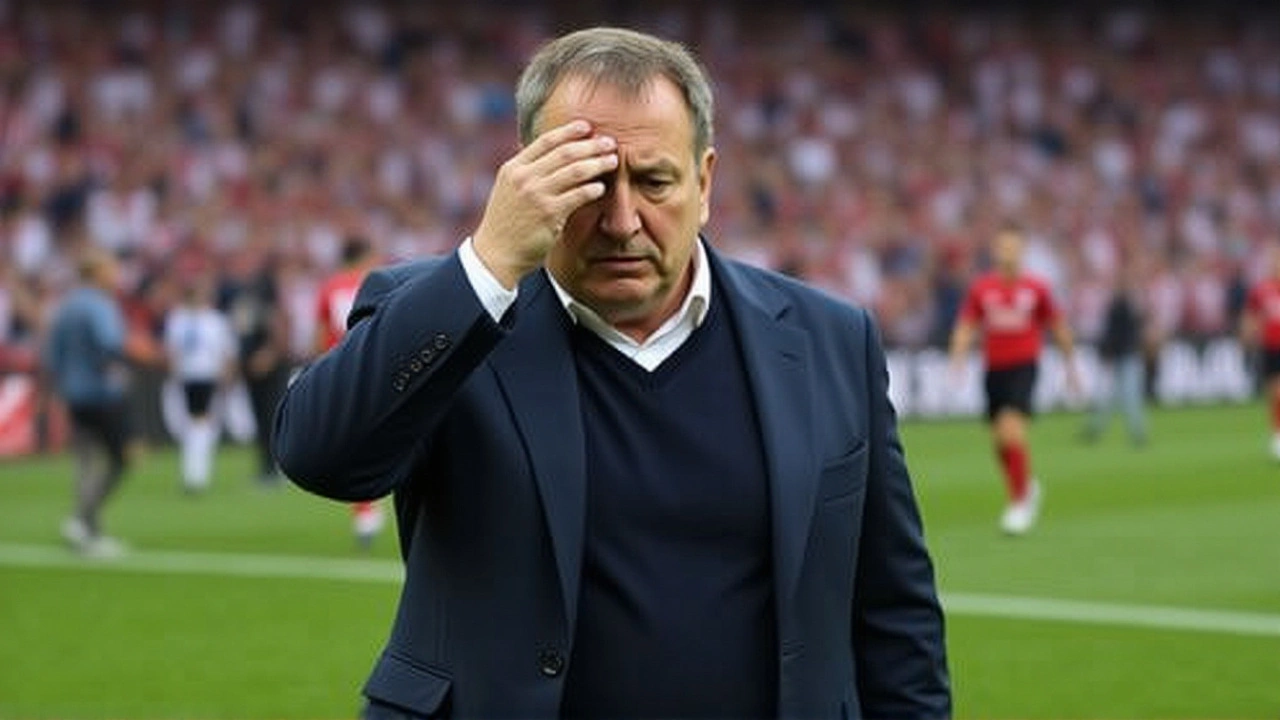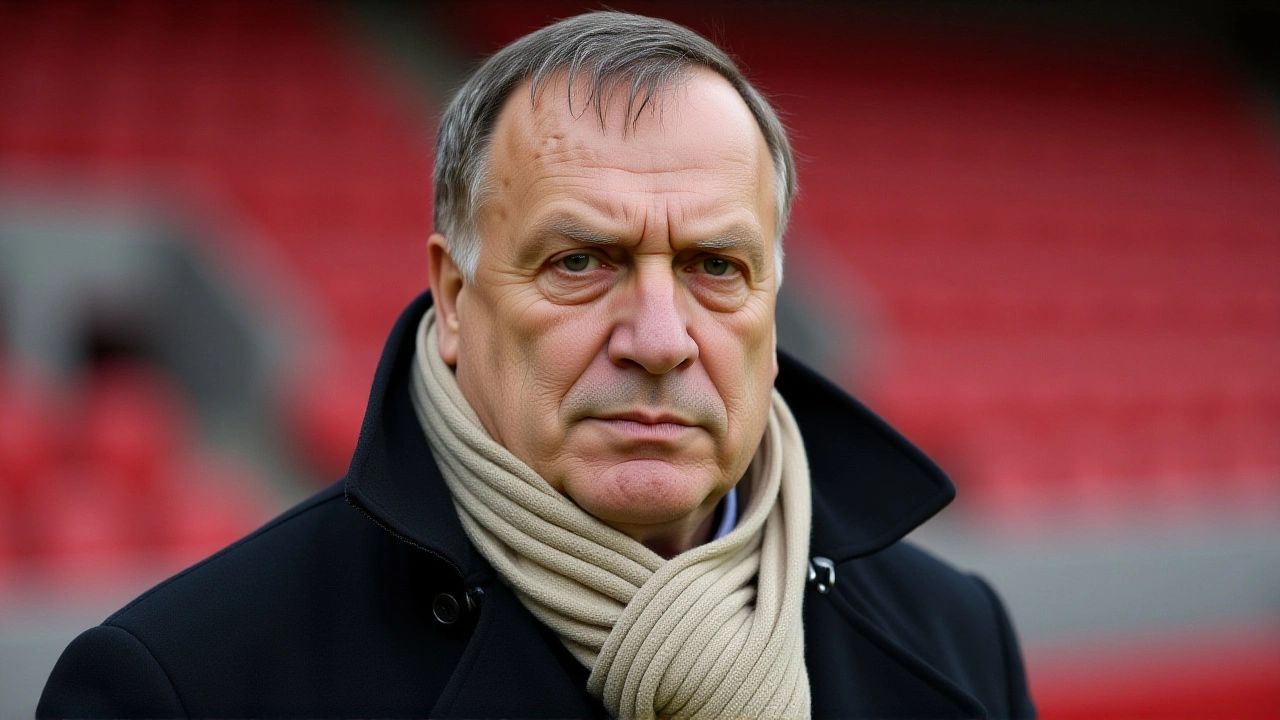On August 17, 2016, Fenerbahce SK stunned Turkish football by replacing Portuguese manager Vitor Pereira with 76-year-old Dutch veteran Dick Advocaat — a move that felt less like a refresh and more like a return to familiar ground. The Istanbul giants, headquartered in Halıcıoğlu, Üsküdar, had just endured a shaky start to the 2016–17 season, and with the 2016–17 UEFA Europa League already underway, they needed a steady hand. Advocaat, already a legend in Dutch football, was brought back — not for the first time — to steady the ship.
Why Advocaat? A Manager Who’s Seen It All
Advocaat isn’t just any coach. He’s the kind of figure who walks into a dressing room and the players know they’re in for discipline, structure, and old-school football intelligence. He’d previously managed PSV Eindhoven in the mid-90s, guiding Brazilian superstar Ronaldo and Belgian striker Luc Nilis to near-domestic glory. He’d coached the Netherlands national team twice — and walked away from the second stint in 2004 after a controversial Euro 2004 substitution of Arjen Robben sparked outrage, even death threats. That’s the kind of pressure he thrives under.By 2016, he’d already returned to Feyenoord for a brief stint after Jaap Stam’s resignation, winning his first match 3–0. But Fenerbahce? That was personal. He’d managed them once before — in the 2016–17 season — and now, after Pereira’s dismissal, they were bringing him back to finish what he’d started.
The First Game: A Statement Win
Advocaat’s return wasn’t subtle. His first match in charge was a UEFA Europa League home fixture against Grasshopper Club Zürich at Şükrü Saracoğlu Stadium on August 18, 2016. Fenerbahce won 3–0. No fluke. No mercy. The crowd of 53,978 — the stadium’s full capacity — roared. It was a statement: this wasn’t a caretaker appointment. This was a restoration.Then came the moment that sent shockwaves through European football. On November 3, 2016, Fenerbahce hosted Manchester United FC in the Europa League group stage. The English giants, led by José Mourinho, were favorites. But Advocaat’s tactical discipline — compact midfield, quick transitions, clinical finishing — delivered a 2–1 victory. Fenerbahce finished the group with 13 points, top of the table. Manchester United? They finished third and tumbled into the Europa League’s knockout round. The result wasn’t just a win. It was a humiliation for one of Europe’s giants.

A Club That Can’t Stay Still
Fenerbahce has a history of managerial whiplash. In the last decade alone, they’ve hired Zico, Phillip Cocu, and now, twice, Advocaat. The club’s board, often criticized for impatience, seems to believe that big names equal instant success. But it rarely works that way. Pereira was fired after just seven months — despite winning the Turkish Cup in 2015–16. Advocaat’s appointment wasn’t about potential. It was about damage control.And yet, there’s a pattern: when Fenerbahce hires someone with deep European pedigree — someone who’s navigated pressure, politics, and big egos — they tend to get results. Advocaat didn’t just manage games. He managed expectations. He didn’t need flashy tactics. He needed structure. And he delivered.
The Legacy of a Second Stint
Advocaat’s second spell at Fenerbahce lasted only until the end of the 2016–17 season. He didn’t renew his contract. But he left behind more than points. He left behind belief. The team had beaten Manchester United on their own turf. They’d reached the Europa League round of 16. And for the first time in years, the fans felt like their club was being led by someone who understood what it meant to carry Fenerbahce’s weight.What’s often forgotten is that Advocaat was 76 when he took the job. Most coaches retire by 65. But he didn’t see it as age. He saw it as experience. He knew how to handle volatile locker rooms, how to calm panic, how to win without flair. In a league where managers are fired for losing one game, Advocaat was the calm in the storm.

What Happened After?
After leaving Fenerbahce, Advocaat quietly stepped away from top-level management. He didn’t vanish — he remained involved in Dutch football, occasionally advising youth setups. But his time at Fenerbahce remains one of his most memorable chapters. It proved that even at 76, he could outthink Europe’s best. And that, perhaps, is the real legacy.Frequently Asked Questions
Why did Fenerbahce fire Vitor Pereira after only seven months?
Despite winning the 2015–16 Turkish Cup, Pereira’s league form collapsed in the 2016–17 season. Fenerbahce lost three of their first five Süper Lig matches and looked unorganized defensively. The board, known for impatience, lost confidence after a 2–1 home loss to rivals Galatasaray, and with Europa League qualification on the line, they turned to Advocaat for instant stability.
How did Advocaat’s tactics differ from Pereira’s?
Pereira favored a possession-based 4–2–3–1, which often left Fenerbahce exposed on the counter. Advocaat switched to a compact 4–4–2, prioritizing defensive shape and quick transitions. He trusted veteran players like İsmail Köybaşı and Yasin Öztekin to control the midfield, and his use of wing-backs created width without overcommitting — a system that neutralized Manchester United’s attacking threats.
Was Advocaat’s win over Manchester United a fluke?
No. Fenerbahce had already beaten FC Basel and Maccabi Tel Aviv in the group stage, showing consistency. Against United, they absorbed pressure, defended in blocks, and scored from set pieces — a hallmark of Advocaat’s teams. Mourinho’s side lacked creativity, and Fenerbahce’s discipline was flawless. It was a tactical masterclass, not luck.
Why did Advocaat leave after just one season?
Advocaat cited personal reasons and the physical toll of managing at 76. He’d achieved his goal: stabilizing the team and securing top spot in the Europa League group. He didn’t want to commit to another season amid Fenerbahce’s frequent managerial turnover. He left on his own terms — a rare move in Turkish football.
How does Advocaat compare to other Fenerbahce managers like Zico or Cocu?
Zico brought flair but struggled with discipline; Cocu was tactically modern but lacked authority in high-pressure moments. Advocaat blended both: he was old-school in structure but modern enough to adapt. His win over Manchester United remains the only time Fenerbahce has defeated the English giants in a competitive match — a record no other manager has matched.
Is Advocaat still involved in football today?
No. Since leaving Fenerbahce in 2017, Advocaat has remained out of the spotlight. He occasionally attends Dutch national team matches and offers advice to youth coaches in the Netherlands, but he has not taken another professional managerial role. His legacy, however, lives on — especially in Istanbul, where fans still recall the night they beat Manchester United.






